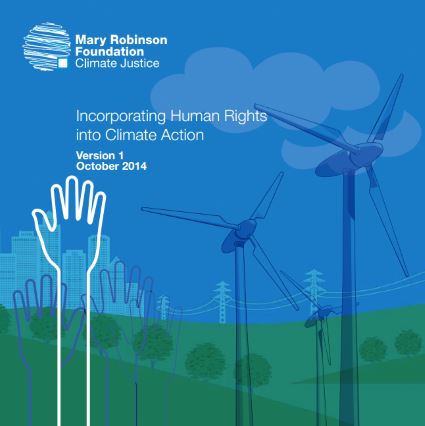New research on equity and human rights informed the ADP Intercessional in Bonn - October 2014
The Mary Robinson Foundation – Climate Justice, used this opportunity to convene a group of 23 senior negotiators representing a range of regional groups on the evening of the 23rd October to present new climate justice research.
Tara Shine, Head of Research and Development at the Foundation presented the key findings from the Foundation’s latest research on human rights and climate change and the equity dimensions of a carbon phase-out. Participants discussed how these considerations could inform the draft text for Lima/ COP20.
The recommendations in the Foundation’s research are supported by two recent proposals, an open letter from 28 UN independent human rights experts to all Governments; and the International Bar Associations’ recently published task force report on “Achieving Justice and Human Rights in an Era of Climate Disruption”.
On the issue of a phase-out goal, the Foundation outlined preliminary findings of commissioned research on the equity concerns of a carbon-phase out with Tara Shine stating: “A zero carbon world must engage people and to do so it must be participative, fair and protect human rights.”
The Foundation believes that “greater communication between actors working on climate change with those working on human rights can help to build a greater understanding of the solutions that are good for people and good for the planet.”
Related links:
Bonn Climate Change Conference – October 2014
Open Letter signed by 28 UN Human Rights Experts
Watch and Listen to Kathy Jetnil-Kijiner’s intervention at the Climate Summit 2014
Incorporating Human Rights into Climate Action
The research summarised in this booklet is the product of an extensive survey conducted by the Foundation to assess the extent to which countries are respecting human rights in climate action. The research examined all National Communications submitted to the UNFCCC since 2010 along with any National Adaptation Plans of Action (NAPAs) submitted by Least Developed Countries (LDCs) over the same period. To further understand the landscape of human rights and climate change, the research also considered reports to the Universal Periodic Review (UPR) of the Human Rights Council (HRC) since 2010.
The research summarised in this booklet is the product of an extensive survey conducted by the Foundation to assess the extent to which countries are respecting human rights in climate action. The research examined all National Communications submitted to the UNFCCC since 2010 along with any National Adaptation Plans of Action (NAPAs) submitted by Least Developed Countries (LDCs) over the same period. To further understand the landscape of human rights and climate change, the research also considered reports to the Universal Periodic Review (UPR) of the Human Rights Council (HRC) since 2010.


